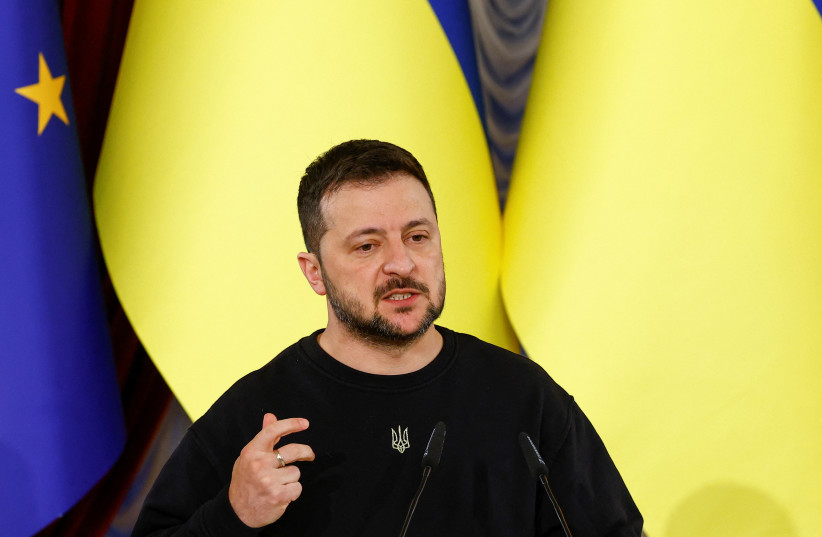In a development reflecting the worsening crisis facing Ukraine in its war against Russia, Ukrainian President Volodymyr Zelensky dismissed several of his advisers and assistants, including Serhiy Shefir, his right-hand man since 2019.
Last September, Zelensky fired defense minister Oleksii Reznikov and appointed Rustem Umerov in his place in the biggest leadership shakeup in the Ukrainian military since February 2022.
Although the stated reason was the need for a new approach and other forms of interaction with both the army and society as a whole, the real reasons stemmed from corruption scandals linked to the Ukrainian Defense Ministry and, more importantly, the failure of the Ukrainian army’s much-touted counteroffensive, heavily promoted in the West as the one that would bring the desired defeat of the Russian army.
Zelensky’s firing of his closest advisers reflects the enormity of the crisis he faces as the Ukrainian army loses the country’s cities one by one and struggles to maintain defensive positions against advancing Russian forces.
Zelensky has failed to achieve any of his goals and is leading his country into an abyss after losing many parts of Ukraine, its infrastructure and economy destroyed, and millions of people displaced after two years of war.

According to Transparency International’s 2021 report, Ukraine is considered the second most corrupt country in Europe after Russia, ranking 122nd out of 180 countries globally.
Fighting corruption was Zelensky’s main rallying cry in his rise to power in 2019, and indeed, combating corruption in Ukraine is a vital requirement for the country, which has officially become a candidate for EU membership.
The EU emphasizes Kyiv’s urgent need to intensify its anti-corruption efforts as a condition for full membership. However, time is not on Ukraine’s side, and conditions do not seem favorable for meeting membership requirements or even tackling corruption.
His predicament is multi-faceted
Zelensky faces a multi-faceted predicament, especially on the battlefield, evidenced by statements from Estonian Prime Minister Kaja Kallas, who expressed concern about Ukrainian forces running out of ammunition and shells, and their inability to evacuate their wounded under intense Russian shelling.
Estonian Defense Minister Hanno Pevkur stated that Europe lacks the funds to buy ammunition for Ukraine. Additionally, he stressed the necessity of inspecting such ammunition before dispatching it to the front lines, indicating potential delays until the end of the year. He is urging donor countries to provide more financial support despite the shortage of funds and ammunition, using political tactics to motivate increased funding. This predicament was confirmed by Russian Defense Minister Sergei Shoigu’s recent announcement that Ukrainian forces have lost over 71,000 soldiers and 11,000 pieces of military equipment since the beginning of the year, noting that the Ukrainian army’s losses this year were nearly three times higher than in the same period last year.
Zelensky is seeing other symptoms of this predicament, including some of Ukraine’s European allies backtracking on continued support, such as Poland, one of Kyiv’s most important allies, closing its borders to Ukrainian exports.
Overall, Ukraine’s defeat looms on the horizon with much evidence, raising growing concern in Europe, especially given the profound implications of this potential scenario. Foremost is the devastating strategic impact on the NATO alliance and the European Union. Some observers even expect widespread divisions within the two blocs that could lead to their collapse or disintegration.
Faced with this, Zelensky has begun talking about negotiating with Russia, recently stating for the first time that he does not rule out negotiating on pre-Russian military operation borders.
He said peace talks with Moscow are possible regarding the 2022 borders after Kyiv had insisted on liberating “every last speck of soil and returning the Russian army to the 1991 borders,” meaning the borders before Crimea’s accession to Russia – a stance understood as an initial declaration of his position on negotiations.
Some now see Zelensky as a major obstacle to attempts to preserve what remains of Ukraine. Still, the West will not completely abandon him before finding a suitable formula for resolving the crisis. Likely, the Biden administration and its European allies will continue to discuss supporting Ukraine in the coming period, with the position on this issue to be decided after the US presidential election in November.
However, this scenario excludes Russia’s stance, as it continues its military advance and attempts to exploit European disarray. It is also coupled with delays in US support for Ukraine due to congressional disputes seeking to resolve the conflict – or at least make progress toward gaining control over more Ukrainian territories to bolster its position in any potential negotiations to resolve the crisis.
The writer is a UAE political analyst and former Federal National Council candidate.
